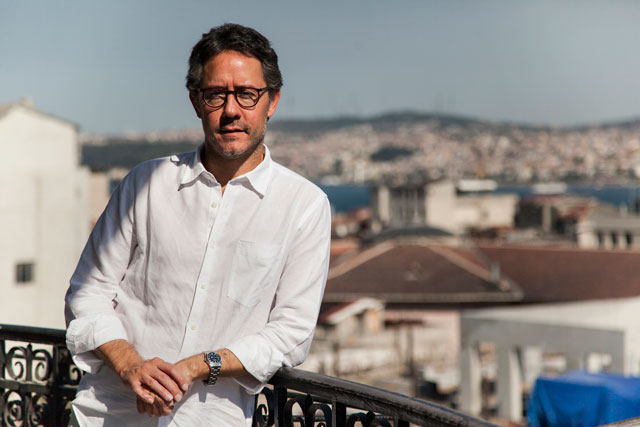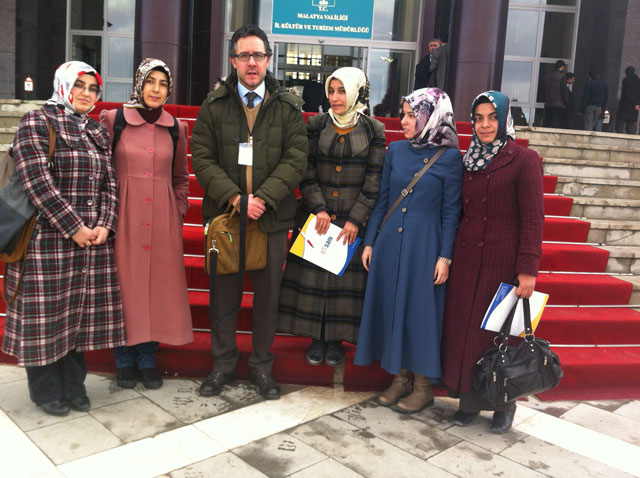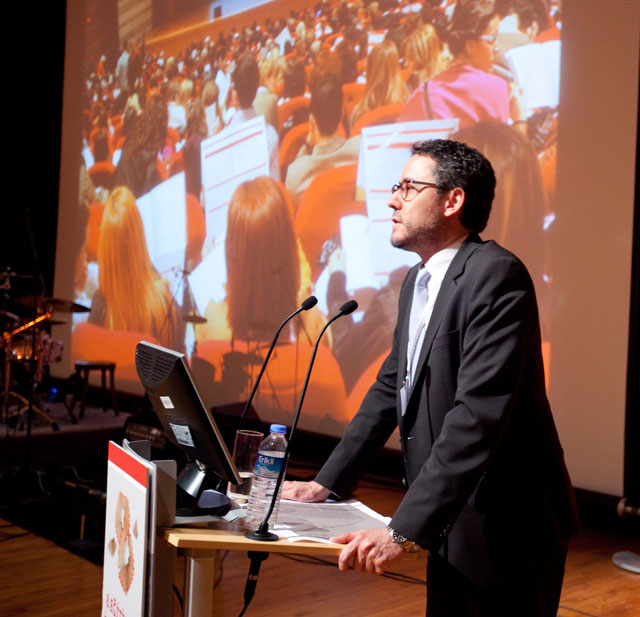
Batuhan Aydagül had come up with “a witty idea” for class some 12 years ago, while enrolled in the International Education Policy Analysis master’s program at Stanford Graduate School of Education.
That day Christine Min Wotipka, Associate Professor (Teaching) of Education, was leading the applied research methods course on the need to incorporate issues of gender equity when studying education.
“Frankly speaking, I was not very fond that we had to study feminist research methods just because our professor was feminist,” said Aydagül, MA ‘02, now director of the Istanbul-based Education Reform Initiative. It was a class of 12 people, out of which three were men and nine were women. “Of the three, one was Japanese, the other Chinese, and me, a Turkish man,” he noted, adding, “I asked the two other men to sit with me, took this white paper and wrote, ‘United Men of Asia Against Feminism,” and put it in front of all of us.”
In came Professor Wotipka.
“I know she noticed it,” Aydagül recalled. “But she didn’t give it any reaction.” She just continued teaching, until it was time for a coffee break.
The International Comparative Education concentration at Stanford, which now includes masters and doctoral programs, will celebrate its 50th anniversary next year. Since its precursor — SIDEC, or Stanford International Development Education Center — hundreds of its students from around the world, such as Aydagül, have come to explore how educational problems in industrialized and developing countries are closely tied to economic, political and social development—and how different social science concepts and methodologies expand their capabilities as researchers and analysts.
Graduates of ICE’s master’s and doctoral programs (and SIDEC) include past presidents of Peru, the Maldives, and Guatemala; the advisor of the Secretariat of Public Education in Mexico City; ministers of education in Tanzania and Kenya; program officers at the American Indian Foundation and Organization for Economic Cooperation and Development; researchers at Bhutan’s Royal Academy, SRI International, UNESCO and the World Bank; and education professors in universities in North America and abroad.
“We are eager to train students who are committed to returning to their home countries and to make lasting and meaningful impacts on their educational systems,” remarked Wotipka, herself a graduate of ICE’s doctoral program and now the director of its masters program.
The principle of “education for all,” regardless of race, religion or gender, has been a cornerstone of ICE, one that it aims to impart to its students. While the awarding of the 2014 Nobel Peace Prize to Malala Yousafzai and Kailash Satyarthi underscores how the issue of the right to education—especially for girls and vulnerable children— has taken center stage, it was not always so high profile. Indeed, on that day in 2002, Wotipka had a difficult lesson to teach.
When Aydagül returned to the classroom, the white sign remained where he had left it, but there had been one change: It now read, “United Men of Asia Understanding Feminism,” with the word “against” crossed out. Aydagül attended the rest of the class, and neither he nor Wotipka mentioned the sign to each other.
For the research paper required of all students in the Masters program, Aydagül analyzed the 1997 Compulsory Education Law in Turkey, tracing how the tensions between seculars and Islamists and the role of the global “Education for All” movement interact to shape education policy. It was good work, but there was no sign of his becoming an advocate for gender equity.
Soon after graduating from Stanford in 2002, Aydagül moved back to his native Turkey, determined to play a role in shaping education policy in his country.

Once a currency exchange trader, Aydagül came to Stanford to embark on a new career: He wanted to follow in the footsteps of his family — a long line of educators. His paternal grandmother taught preschool in post-revolutionary Russia, and his maternal grandfather set up schools in rural Turkey in the early days of the Turkish republic. His parents ran the British International School Istanbul, a private K-12 school known for sending its graduates to universities in the United Kingdom and United States.
“The learning blood in my family was a strong factor when I decided to quit banking, as much as it made me feel powerful,” he said.
Despite growing up in a self-described “culturally progressive and pretty equal family,” Aydagül said that his attitudes about women in education were in sync with the views of “traditional” gender roles that prevailed in Turkey. The emphasis was on women belonging in the home, raising children, and men holding the positions of authority.
Upon his return from Stanford, Aydagül landed a job at the Education Reform Initiative, a new nongovernmental “think-and-do tank” at Istanbul’s Sabanci University aimed at improving education policy and decision-making. One of his first assignments: To draft a position paper on gender equity in education.
“I found myself co-authoring the paper with a renowned scholar on gender issues and a young research assistant, both women,” he said, adding with a laugh, “It was as if Professor Wotipka arranged it on purpose.” His two colleagues constantly reminded him of the lessons he had heard from Wotipka. “They helped me to care more about contributing to a gender-sensitive education pedagogy,” he said.
Female literacy rates in the country at that time ran significantly behind that of males, with just under 80 percent for women compared with 95 percent for men. Female illiteracy dipped even lower in rural southeast provinces and urban migrant settlements at just 50 percent.
While the government launched a national campaign to educate girls — some 239,000 more were enrolled over the next five years — Aydagül’s research had revealed to him that increasing girls’ school enrollment alone would not bridge the gap. “That paper opened my eyes to the dire challenges Turkish women face to access education,” he said. “Yes, we could eventually ensure that girls attend school, but is it enough to change attitudes toward gender issues? The legislation, curriculum, the mostly male bureaucrats and school administrators, classroom practices and teachers’ attitudes all favored gender discrimination. That needed to change.”
The national girls’ education campaigns prompted Aydagül and ERI to team up with two nonprofits to conduct research, advocacy and training activities to promote gender equality in social participation and education. They sought to create a more grassroots, democratic alternative to the national initiative’s top-down approach. Aydagül was selected to serve as the head ERI representative in the project.
The Ensuring Gender Equity in Education and Social Involvement project won funding from the European Commission, standing out for its ambition and scope. It launched in 2005 in Istanbul and three provinces in southeastern Turkey that have high rates of emigration, female illiteracy and low school enrollment of girls. Over the next four years, a total of 10,000 illiterate women ages 15 to 24 participated in literacy and civics engagement workshops, and thousands more—including parents with young daughters, local authorities, journalists and policymakers—took part in parent training seminars and public information sessions.
Aydagül and his collaborators also formed civil monitoring groups to report on gender disparities in their area schools, analyze causes, generate policy recommendations and pressure local officials to implement them — a first in a country where state bureaucrats traditionally exercise control over education policymaking. “The education bureaucracy leaves not much room for alternative voices,” he said.
In an even bolder move, Aydagül and his partners invited representatives from the monitoring groups to speak at meetings, where they presented their reports to education stakeholders — including many of Turkey’s senior officials at the Ministry of National Education and members of the Turkish parliament. Organizers and participants brought to attention, among other topics, the rise in primary school dropouts over the previous decade, even though Turkey had instituted a mandatory eight years of primary education.
“As early as 2005, we were concerned there was too much emphasis on getting girls in school, but not enough on staying in school,” said Aydagül.
What was particularly remarkable is how the monitoring groups zeroed in on an often-overlooked factor behind this rise: the state’s negligence of girls whose mother-tongue was not Turkish, the official language used in schools. Substantial numbers, especially children of seasonal migrant workers, use Northern Kurdish, Arabic and Zazaki as their primary language. While the sons of these immigrants are often encouraged to learn Turkish, Aydagül said that it was much less the case for the daughters. “By their third or fourth year, the girls have an increasing perception that they cannot succeed in school,” he explained. “They are more likely to leave, since the families generally don’t insist on girls to stay in school as they do with boys. ”
At a national conference, a representative of the Ministry of National Education in the audience downplayed the findings from the monitoring groups, preferring to paint a rosier picture of the situation in the provinces. But organizers and presenters pushed on. Aydagül said, “During the discussion, I said that we had done research in southeast Anatolia on reasons for non-attendance, and the research showed that the likelihood of dropping out was higher for students whose mother tongue was not Turkish. Our research and the monitoring of the civil groups complemented each other.”
That combination of advocacy and civil and academic reporting, he said, ultimately persuaded Ministry officials to begin to take measures to monitor and prevent girls’ dropout in the hardest hit regions. Seven years later Turkey offers mother-tongue language courses as electives in middle school, and the Ministry recently launched a project to support the education of children whose mother-tongue is not Turkish. “That’s how education policy change works — slowly, gradually and painfully,” he said.
The project also contributed to Turkey’s significant progress in starting girls in school compared with a decade ago: nationally, the primary and secondary schooling rates for both genders are now about 100 percent and 70 percent respectively.

Today, ERI is recognized as a leading public voice for education policy in Turkey and globally, and Aydagül is its director. World Bank and OECD education experts cite its reports, and the University of Pennsylvania Think Tanks and Civil Societies Program included it as one of the world’s leaders in the “Best Education Policy” category. The Chicago Council on Global Affairs honored Aydagül in 2012 for his efforts to generate innovative solutions to challenges in Turkey’s schools, education system and education policies.
"It is not surprising that Batuhan has become a leader in fighting for gender equality in Turkey,” said Martin Carnoy, the Vida Jacks Professor of Education at Stanford and an ICE faculty member. “The ICE program not only equips our students with the tools to become excellent policy analysts and researchers, but also gives them a sense that they can and should use these tools to create more just and fair societies."
The latest report by Aydagül and his ERI colleagues documents a marked shift in Turkey toward greater Islamic influence over education. According to ERI, the number of imam hatip (state-funded Muslim clerical training) schools has increased 73 percent since 2010-11, leaving many students living in more rural areas no choice but to attend a religious school. This fundamentalist shift in schools is leaving Aydagül and other educators deeply concerned about Turkey’s ability to provide a quality education for both genders. The report prompted a story in The New York Times.
“If you narrow down the supply of education on one level and expand imam-hatip-type schools on the other, there is a risk of creating circumstances where children can’t easily find placement in a regular school,” Aydagül told the Times. “They find themselves — not necessarily out of choice but out of obligation — in an imam-hatip. We are concerned that there is reverse discrimination.”
Aydagül elaborated in an email interview for this article: “What’s ahead of us is more daunting. Is Turkey dedicated to providing a quality education to all children, one that builds the foundation of a gender-equal society by eliminating traditional cultural and patriarchal gender codes and stereotypes? It is not possible to answer this question. But fortunately, we have many women and an increasing number of men dedicated to tackling this challenge.”
ERI remains committed to research and policy analysis that will ensure that women have the same education opportunities as men. Among its current programs, ERI is busy conducting research on early childhood education and services in Turkey in an effort to push for the establishment of free, high-quality early childhood education services locally and nationally. It is also working to improve gender awareness education in Turkey’s classrooms. “We have always kept the issue of gender equity on our radar and have brought it up on every opportunity possible, in all of our research and training activities,” Aydagül said.
Aydagül speaks publicly about the need for greater educational opportunities for women, and he sometimes recounts his experience in Wotipka’s class. (It’s even on YouTube.)
Several years ago, he ran into his former professor at the annual meeting of the Comparative and International Education Society. He told her of his work related to gender and education and how her feminist viewpoints had up until that time been his only interactions with gender issues; if it hadn’t been for her, he said, he would not have been as open to working on such topics. The change she made on his sign made an impact.
“It was a very smart but true move,” he said. “A window opened for me. Sometimes all you need is to let the oxygen fill the room, and change takes place afterwards.”
Amy Yuen writes frequently for websites and publications of Stanford Graduate School of Education.